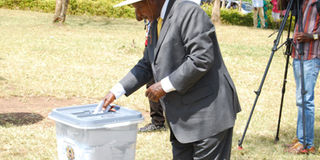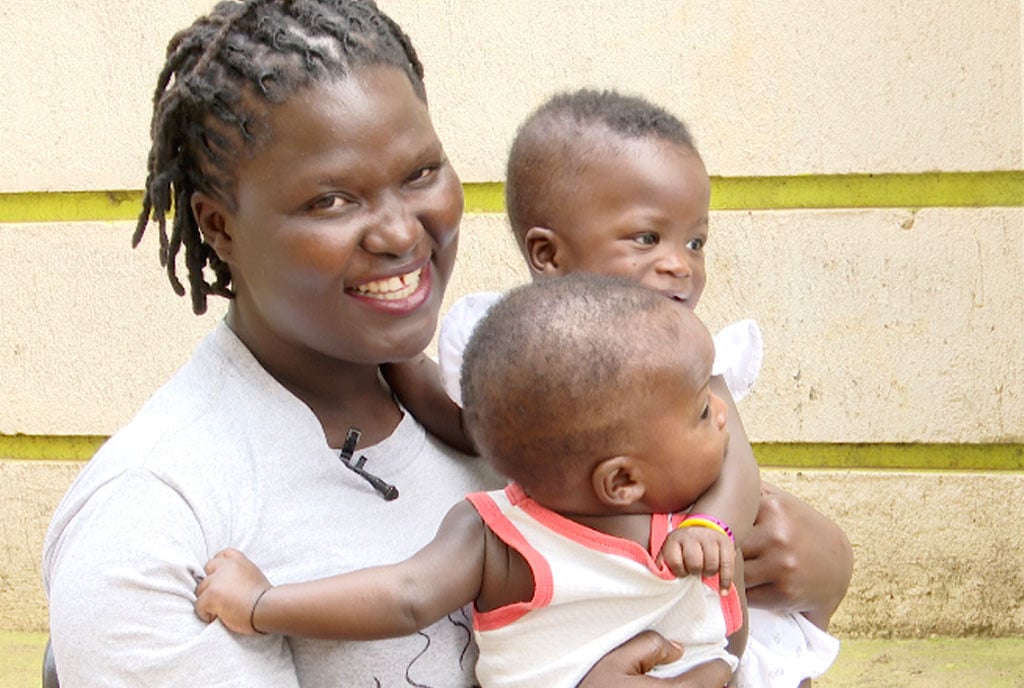Prime
Challenges Museveni will face in new term

President Museveni voting through a secret ballot. Such should be the ideal mode of voting in a modern society. File photo
President-elect Yoweri Museveni enters a new five-year term with a plateful of challenges, a cocktail of hurdles he has jumped over the last 30 years and an unresolved transition puzzle.
With a new lease of life from at least 60 per cent of the voters on February 18, which is being contested, Museveni, who faced one of the stiffest contests since he first stood for president in 1980, has more sceptics than positive energy.
His former prime minister Amama Mbabazi hinged his change campaign gospel on the question, “do you want change or more of the same?”
A sizeable fraction of the country feels Museveni comes with a dose of ‘more of the same’ to address growing socio-economic challenges ranging from youth unemployment, sky rocketing foreign debt and limping social service delivery.
Local government elections this week registered a dismal turnout with polling stations such as Bazar Market Street polling station in Kumi District having 50 voters of the registered 657 casting their ballots.
Museveni’s critics linked the low interest in the local government poll to what emerged as the most controversial election since 1980, with local and international observers asserting the vote fell short of “international benchmarks for any democratic process”.
The election is now a matter for the Supreme Court to annul or uphold. But whatever decision the court makes, Museveni enters office in May – when he is expected to swear in – with his credibility and legitimacy dented.
Confidence and will of populace
In his book, From Third World to First World Lee Kwan Yew, the father figure of Singapore’s transformation, lays more emphasis on “confidence and will of the populace”.
Where that lacks, mistrust and mutual suspicion between state and citizen reign.
For Mr Museveni, analysts opine, the use of coercive force – with military and police manning every potential boiling pot of civic unrest – will be the symbol of public order management in the new term.
Already Kololo Independence Grounds has turned into a military and police ‘barracks’ with increased deployment of security operatives in all major towns. Pundits fear security spending is likely to shoot up.
The 2014/2015 Budget estimates read out to Parliament by then Finance minister Maria Kiwanuka allocated more than Shs1 trillion up from Shs838 billion in the 2013/14 financial year to security.
That was 7.1% of the Shs15 trillion Budget. In the Defence committee’s report to Parliament, it was noted that the entire security expenditure on classified budgets had risen from Shs122 billion to Shs300 billion in the 2013/14 financial year.
The Ministry of Defence, Security, Internal Affairs, Uganda Police Force, Uganda Prisons Services and the Directorate of Immigration fall under the security docket.
Last year legislators on the Defence and Internal Affairs committee grilled police leadership over the “exorbitant expenditure on public order management”.
The committee was not amused that police had spent Shs10.242 billion to quell four incidents under the public order management docket as of September 2013.
According to the 2013/2014 budget framework, police sought more Shs40.2 billion for managing 25 “public order incidents”.
Mr Muwanga Kivumbi, the Butambala County MP, said at the time, “spending Shs2.5 billion on a single incident is exorbitant” and faulted police for, “hiding under public order management to haemorrhage public funds.”
Mr Yona Kanyomozi, a veteran politician and former minister of cooperatives in the Milton Obote II government, thinks Museveni enters the new term with little to worry about.
He told Sunday Monitor in an interview on Thursday: “Museveni has no challenge because he has his money and the army except you disgruntled guys. He is likely to wriggle it out because the Opposition has no structures, except talking on radio and TV.”
“And the international community which would have come after him cannot touch him because he has been fighting their wars in Somalia and South Sudan and no one will go to the streets to demonstrate, those who dare will be teargased back home.”
Transition question
How much Mr Museveni achieves in this term is interlinked with his own presidency project and how far he is determined to stretch it essentially because every turn he makes at decision making level has to factor in his political interests.
The 1995 Constitution, if left intact, makes this his last term. But the President has not committed himself to this term as his last. He has only said, “We shall respect the Constitution”.
In his 2001 manifesto, Mr Museveni, who in the late 1980s opined that Africa’s problem is leaders who over stay their welcome, vowed he was running his last race. He reneged on the same position and got MPs, accused of pocketing Shs5m to lift the constitutional restraint on a two five-year term limit.
Parliament where NRM will command more than 70 per cent majority will continue to be, according to critics, a rubberstamp of the Executive’s wish list
In the book Elections in A Hybrid Regime, Kristof Titeca writes in an article titled ‘the commercialisation of Uganda’s 2011 election in the urban informal economy: Money, bodabodas and market vendors’ notes that “This politicisation had a number of effects”.
“First, the Sacco public policy was not merely perceived and sometimes communicated as the programme of a political party, but it was also executed as a political rather than a technical programme.”
This could be true with multibillion women, youth and innovation funds that government has budgeted for as has been the case with National Agricultural Advisory Services where politics takes priority and the intended outcome of the project gets lost in the web of partisanship.
Museveni’s critics fault him for fusing State organs and apparatus with the ruling party, but also remodelling the nerve of their operations around his own political enterprise project.
Dr Fred Muhumuza, an economist and former adviser to the Finance minister, says: “He still faces the same challenges of an over stretched budget that undermines service delivery with infrastructure spending, which is not about to end, being the priority. So he will not improve service delivery.”
The 2016 election was filled with presidential candidates visiting hospitals and schools in dire conditions to expose how broken the service delivery machine is.
Corruption fight
“No government can fight corruption better than the NRM government,” Mr Museveni told his former competitors at the presidential debate.
He has always rated his performance on the anti-corruption front highly, but the leakages and losses to graft seem to say otherwise.
Civil society activists have argued that Museveni’s government “thrives on corruption because it is the fuel of the system” and doubted its ability to uproot the vice.
Uganda is ranked by the East African Bribery Index as the most corrupt in the East African region.
Dr Muhumuza opines, “The institutional framework is still weak so there will be no value for money and he cannot fight corruption.”
But if Museveni resolves to make this his last term, Muhumuza opines, “He can do so much as he did in the first 10 years. But since we began electoral democracy he became more of a politician than a transformer. You need a UNRA-like clean up in critical areas such as Ministry of Health, Education and Finance.”
Bad global economy
Mr Museveni also kick starts his five year term against the backdrop of a warning by International Monetary Fund that the global economy is vulnerable and urging USA and other big global players to roll out contingency plans.
In 2011, much as double digit inflation was tied to State officials dipping their hands in the public coffers, the story was complete with a look at the global economy which again took a beating with price fluctuations rocking Africa and beyond and weak currencies taking a whipping from the dollar and pound.
Museveni’s grip on power was shaken with the walk-to-work demonstrations which focused on the high cost of living to bring the regime to account.
A gloomy global economy does not augur well for Uganda’s oil sector which Mr Museveni is banking on to finance the country’s ambitious infrastructure projects estimated at $10b (Shs33.5 trillion) by the IMF in the next decade.
“The investors will be shelving new ventures to consolidate what they have, no investor will pump money into our oil sector at least in the next five years and I don’t think we are about to get a barrel of oil out soon,” Dr Muhumuza says.
And yet throughout his campaign, Mr Museveni has promised roads virtually in every part of the country he has taken his “steady progress” gospel to. The demand for him to get the infrastructure right, for a country wallowing in more than $7b (Shs23 trillion) in foreign debt is not in sight.
Former Uganda Investment Authority executive director Maggie Kigozi thinks infrastructure will and should remain on Museveni’s priority list alongside keeping his foot forward on regional security. She says this will harness the dividends from an expanding regional market which could fill up, at least to a small extent, our exports deficit on the international market.
At home, however, especially to ease the investment climate, “we have to find a way of handling the Opposition in such a way that the antagonism stops, how do we come together as a country?”
Dr Kigozi raises a valid point as evidenced by a slowdown in investments in the months before the election where a cloud of uncertainty hovered.
Add to that the battle for Kampala now that Lord Mayor Erias Lukwago, impeached and demonised by the ruling party, is back at City Hall and has more control of the council which can now find it only harder to impeach him.
Lukwago has already touched the defiance dial, telling journalists after his victory, “If Museveni wants personal wars I don’t have his time, I am here for rule of law and constitutionalism.”
For many Ugandans, as Mbabazi pointed out, it will be more of the same. For Museveni, the challenges will be more of the same but meeting point of all these is what Mzee Kanyomozi captured in the line, “he has money and army” to fix any unrest that could arise.
NRM manifesto
The NRM manifesto theme is: Taking Uganda to modernity through jobs-creation and inclusive development.
Under this theme, the NRM manifesto (2016-2021) seeks to lay a solid foundation to transform Uganda into a middle-income country in the next five years:
•Build investor confidence
•Establish innovation centres
•Modernise agriculture to improve household income to Shs25m per annum
•Set up phosphates and fertilisers processing plants in Tororo
•Pursue engagement with EAC members towards realisation of political federation
•Build an oil refinery with capacity to produce 60,000 barrels and an oil pipeline
•More investment in sports
•The national backbone infrastructure project to connect UPDF barracks and police headquarters
•Open Soroti University
•Build teachers houses; construct a primary school per parish.
•Improve clean water accessibility.




